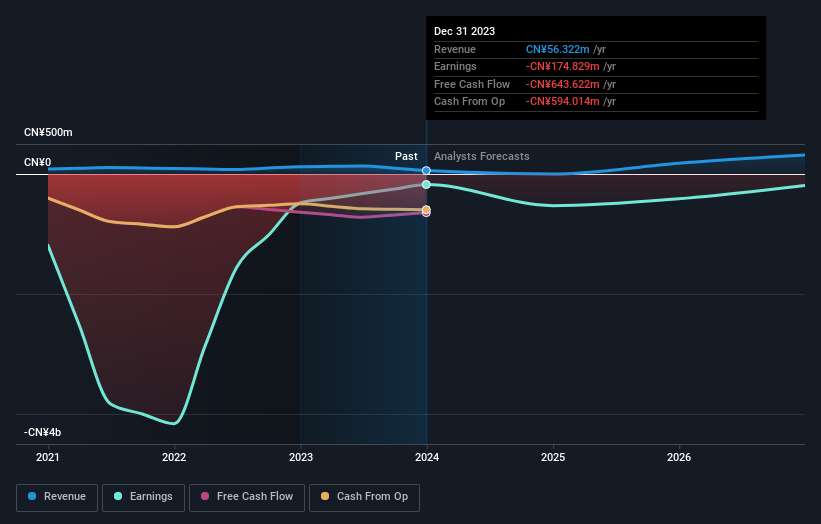Institutions profited after Brii Biosciences Limited's (HKG:2137) market cap rose HK$109m last week but individual investors profited the most

Key Insights
- Significant control over Brii Biosciences by individual investors implies that the general public has more power to influence management and governance-related decisions
- The top 15 shareholders own 50% of the company
- 24% of Brii Biosciences is held by Institutions
To get a sense of who is truly in control of Brii Biosciences Limited (HKG:2137), it is important to understand the ownership structure of the business. And the group that holds the biggest piece of the pie are individual investors with 49% ownership. In other words, the group stands to gain the most (or lose the most) from their investment into the company.
Following a 15% increase in the stock price last week, individual investors profited the most, but institutions who own 24% stock also stood to gain from the increase.
Let's delve deeper into each type of owner of Brii Biosciences, beginning with the chart below.
See our latest analysis for Brii Biosciences

What Does The Institutional Ownership Tell Us About Brii Biosciences?
Institutional investors commonly compare their own returns to the returns of a commonly followed index. So they generally do consider buying larger companies that are included in the relevant benchmark index.
Brii Biosciences already has institutions on the share registry. Indeed, they own a respectable stake in the company. This can indicate that the company has a certain degree of credibility in the investment community. However, it is best to be wary of relying on the supposed validation that comes with institutional investors. They too, get it wrong sometimes. If multiple institutions change their view on a stock at the same time, you could see the share price drop fast. It's therefore worth looking at Brii Biosciences' earnings history below. Of course, the future is what really matters.

Hedge funds don't have many shares in Brii Biosciences. Arch Venture Partners, L.P. is currently the company's largest shareholder with 12% of shares outstanding. For context, the second largest shareholder holds about 9.9% of the shares outstanding, followed by an ownership of 4.6% by the third-largest shareholder. Additionally, the company's CEO Zhi Hong directly holds 4.5% of the total shares outstanding.
A closer look at our ownership figures suggests that the top 15 shareholders have a combined ownership of 50% implying that no single shareholder has a majority.
While it makes sense to study institutional ownership data for a company, it also makes sense to study analyst sentiments to know which way the wind is blowing. While there is some analyst coverage, the company is probably not widely covered. So it could gain more attention, down the track.
Insider Ownership Of Brii Biosciences
While the precise definition of an insider can be subjective, almost everyone considers board members to be insiders. Management ultimately answers to the board. However, it is not uncommon for managers to be executive board members, especially if they are a founder or the CEO.
Most consider insider ownership a positive because it can indicate the board is well aligned with other shareholders. However, on some occasions too much power is concentrated within this group.
Our most recent data indicates that insiders own some shares in Brii Biosciences Limited. In their own names, insiders own HK$38m worth of stock in the HK$817m company. Some would say this shows alignment of interests between shareholders and the board, though we generally prefer to see bigger insider holdings. But it might be worth checking if those insiders have been selling.
General Public Ownership
With a 49% ownership, the general public, mostly comprising of individual investors, have some degree of sway over Brii Biosciences. While this group can't necessarily call the shots, it can certainly have a real influence on how the company is run.
Private Equity Ownership
With a stake of 22%, private equity firms could influence the Brii Biosciences board. Some might like this, because private equity are sometimes activists who hold management accountable. But other times, private equity is selling out, having taking the company public.
Next Steps:
I find it very interesting to look at who exactly owns a company. But to truly gain insight, we need to consider other information, too. To that end, you should be aware of the 1 warning sign we've spotted with Brii Biosciences .
Ultimately the future is most important. You can access this free report on analyst forecasts for the company.
NB: Figures in this article are calculated using data from the last twelve months, which refer to the 12-month period ending on the last date of the month the financial statement is dated. This may not be consistent with full year annual report figures.
Valuation is complex, but we're here to simplify it.
Discover if Brii Biosciences might be undervalued or overvalued with our detailed analysis, featuring fair value estimates, potential risks, dividends, insider trades, and its financial condition.
Access Free AnalysisHave feedback on this article? Concerned about the content? Get in touch with us directly. Alternatively, email editorial-team (at) simplywallst.com.
This article by Simply Wall St is general in nature. We provide commentary based on historical data and analyst forecasts only using an unbiased methodology and our articles are not intended to be financial advice. It does not constitute a recommendation to buy or sell any stock, and does not take account of your objectives, or your financial situation. We aim to bring you long-term focused analysis driven by fundamental data. Note that our analysis may not factor in the latest price-sensitive company announcements or qualitative material. Simply Wall St has no position in any stocks mentioned.
Have feedback on this article? Concerned about the content? Get in touch with us directly. Alternatively, email editorial-team@simplywallst.com
About SEHK:2137
Brii Biosciences
Engages in the research and development of therapies for the treatment of infectious and central nervous system diseases in China and the United States.
Flawless balance sheet low.


